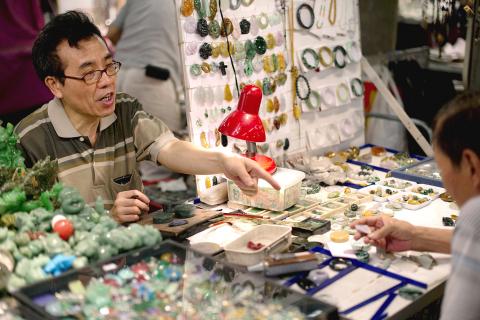Prized as a magical imperial stone, jade is a status symbol of the super rich in Asia, but rocketing prices in the top-end of the market have left traders in Hong Kong struggling to find buyers.
With the cost of high-quality raw jade and jade products surging repeatedly in the past eight years, prices are now becoming prohibitive and experts predict the bubble must soon burst as buyers step back.
Driven up by the appetite of wealthy Chinese, the rising cost of jade is also being fueled by fears of a shortage in supply from Myanmar, the key source.

Photo: AFP
“Consumers cannot accept the current high prices, therefore, no deal is reached,” Hong Kong jade dealer Li Kwong-kei said at the Hong Kong Jewellery and Gem Fair on Friday.
Li, who has participated in the fair for more than 10 years, said it was quieter than in 2011 and last year.
“We are forced to raise prices — it is increasingly hard to get high-quality raw jade from Myanmar. If you do not pay more, the good raw materials will be owned by the others,” Li added, holding a green jadeite bangle with a price of HK$2 million (US$260,000).
“I have decided to wait for the prices of high- and mid-end jade to drop,” said Judy Chen, a Taiwanese buyer at the fair. “It appears to me that their prices are kind of at the peak.”
Small businesses have also been affected — stallholders at Hong Kong’s famous outdoor jade market while away hours chatting, as customers remain sparse.
“I have seen some of my peers quit their businesses,” 54-year-old stall owner Wong Fung-ying said. “The prices are high while the market is quiet.”
Jade holds mythical properties in China, where it is believed to ward off evil spirits and bring better health.
With no international pricing system, values have been increasing since 2005 as the newly rich in China have bought up jade products. Seen as a classier option than gold, it has become a status symbol.
Dealers are now worried that quality raw jade from Myanmar is dwindling as the country plans to process and sell its own jade products.
Myanmar keeps its cards close to its chest in a famously murky trade, and rumors are rife among dealers about its plans as the country opens up economically.
Jade dealer Liang Jianhui, based in China’s Guangdong Province and one of 7,000 buyers at the gem auction in Myanmar’s capital Naypyidaw in June, said that he could no longer afford to buy high-quality jade.
One bidder said the auction had been less busy in the past two years than previously, with high prices putting dealers off.
“I set aside more than 2 million euros [US$2.6 million] for the auction, only to find that I am too poor to win a bid for one single piece of top-end jade,” Liang said.
“If a piece of raw jade sold for 100,000 euros in the past, people would make an offer of 500,000 euros for the same one this year,” he said.
One dealer said Chinese buyers had backed out of collecting their jade after having second thoughts about the high prices, while another said Chinese bidders had gone in high purposely to put the raw jade out of reach of their rivals.
Up to 90 percent of the world’s jadeite — the most sought-after type of jade — is mined in the northern Myanmar town of Hpakant and hundreds of tonnes are transported to state gem auctions, which have until now been held at least twice a year.
However, this year there has been only one major auction, which saw the number of jade lots down by 38 percent compared with the previous auction in March last year, according to local media quoting official figures, although it was still reported to have reaped US$2.4 billion in sales.
“What they want now is not only to export raw materials, but also to process jade domestically and sell it to China,” said Li Lianju, a deputy director of Yunnan Land and Resource Department, who oversees the jade trade between Myanmar and China’s Yunnan Province, a major commercial hub for the gemstone.
“The value of raw jade rises more than 20-fold after being carved and turned into rings, bangles or necklaces,” said Zu Engdong, head of Gemology at Kunming University of Science and Technology in Yunnan.
“So it makes full sense for the Myanmarese to process jade themselves,” he said.
Some fear Myanmar will close the jade mines altogether or slow down production to protect jade sources. Fighting in Kachin State may also have affected jade mining.
What is certain is that prices for those buying raw high-grade jade are astronomical, trickling down to merchants who are upping prices to maintain their profit margin.

SETBACK: Apple’s India iPhone push has been disrupted after Foxconn recalled hundreds of Chinese engineers, amid Beijing’s attempts to curb tech transfers Apple Inc assembly partner Hon Hai Precision Industry Co (鴻海精密), also known internationally as Foxconn Technology Group (富士康科技集團), has recalled about 300 Chinese engineers from a factory in India, the latest setback for the iPhone maker’s push to rapidly expand in the country. The extraction of Chinese workers from the factory of Yuzhan Technology (India) Private Ltd, a Hon Hai component unit, in southern Tamil Nadu state, is the second such move in a few months. The company has started flying in Taiwanese engineers to replace staff leaving, people familiar with the matter said, asking not to be named, as the

The prices of gasoline and diesel at domestic fuel stations are to rise NT$0.1 and NT$0.4 per liter this week respectively, after international crude oil prices rose last week, CPC Corp, Taiwan (台灣中油) and Formosa Petrochemical Corp (台塑石化) announced yesterday. Effective today, gasoline prices at CPC and Formosa stations are to rise to NT$27.3, NT$28.8 and NT$30.8 per liter for 92, 95 and 98-octane unleaded gasoline respectively, the companies said in separate statements. The price of premium diesel is to rise to NT$26.2 per liter at CPC stations and NT$26 at Formosa pumps, they said. The announcements came after international crude oil prices

DOLLAR SIGNS: The central bank rejected claims that the NT dollar had appreciated 10 percentage points more than the yen or the won against the greenback The New Taiwan dollar yesterday fell for a sixth day to its weakest level in three months, driven by equity-related outflows and reactions to an economics official’s exchange rate remarks. The NT dollar slid NT$0.197, or 0.65 percent, to close at NT$30.505 per US dollar, central bank data showed. The local currency has depreciated 1.97 percent so far this month, ranking as the weakest performer among Asian currencies. Dealers attributed the retreat to foreign investors wiring capital gains and dividends abroad after taking profit in local shares. They also pointed to reports that Washington might consider taking equity stakes in chipmakers, including Taiwan Semiconductor

STABLE DEMAND: Delta supplies US clients in the aerospace, defense and machinery segments, and expects second-half sales to be similar to the first half Delta Electronics Inc (台達電) expects its US automation business to remain steady in the second half, with no signs of weakening client demand. With demand from US clients remaining solid, its performance in the second half is expected to be similar to that of the first half, Andy Liu (劉佳容), general manager of the company’s industrial automation business group, said on the sidelines of the Taiwan Automation Intelligence and Robot Show in Taipei on Wednesday. The company earlier reported that revenue from its automation business grew 7 percent year-on-year to NT$27.22 billion (US$889.98 million) in the first half, accounting for 11 percent